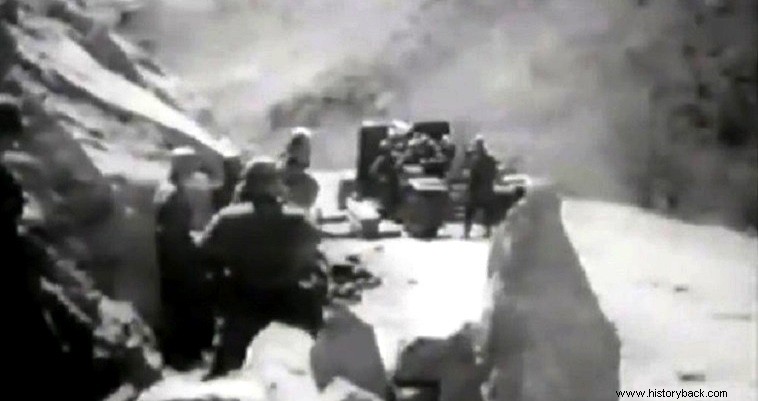
After the Germans had broken the defensive location at Klidis, the only hope left for the Greek forces was to cover the Kleisoura Strait, denying the Germans direct access to Kastoria, in the hope that the Greek armies that were still fighting the Italians in Northern Epirus they would have time to retreat.
The strait of Kleisoura is located between the lakes of Kastoria and Heimaditita, on Amyntaios Kastoria road. The Greek 20th Infantry Division (MP) of the Central Macedonian Army Department (TSCM) had sent two of its battalions, a squadron of mountain artillery and a detachment of pioneers to the strait, as early as April 10, to organize its defense as best they could.
The first attack
The retreating divisions of the division also converged there, after the battle of Kleidis. Thus on April 14 the narrow was guarded by 4 infantry battalions, a machine gun battalion, two covert companies and an infantry mortar company, without mortars. This force was anyway small to stop the powerful German forces.
The reality was no more disheartening. The infantry battalions had almost half the normal line strength. There was little ammunition, no anti-tank guns and minimal artillery – 8 75 mm mountain guns.
However, the Germans did not wait for the completion of the installation of the Greek units in the already poorly organized location. They attacked from the afternoon of April 13, with the first ANSK the hill 1386 (Sagonitsa) which was covered by I/87th Infantry Battalion .
The battalion soon found itself under attack by units of the 1st SS Panzer Regiment, which was also supported by the German artillery of the sector as a whole. Without having any anti-tank weapons, the Greek infantry fought bravely, but in vain. After a five-hour fierce battle, the I/87th Battalion was disbanded.
The losses were heavy. About 30% of the men were captured. The rest were killed. A few escaped and took up positions on hill 1597. The immediate break-up of the position was prevented by a gallant counter-attack by the III/80th Infantry Battalion, which, although it did not succeed in driving the Germans from the positions they had occupied, nevertheless pinned them down in them, prohibiting any further movement of them. However, the losses of this battalion were also heavy. One of his companies was wiped out by heavy German artillery.
Second attack
At 04:30 on the morning of April 14, however, the Germans were reinforced and repeated the attack, this time targeting the Dawli neck, where the 6th Machine Gun Battalion had taken positions. – but which had at its disposal only 10 old machine guns, with no more than 2,000 cartridges per weapon. This battalion, from the moment of its formation, had no means of transportation and, fatally, the men, during the previous retreat, did not manage to transport all the weapons and ammunition.
But both Greek mountain artillery were facing almost complete shortage of ammunition. So their contribution to the fight was almost nil. The Germans charged against the 6th Machine Gun Battalion. Supported by heavy artillery fire, and at first light by scores of Stuka . The enemy tanks approached the Greek positions, without being fired at by any anti-tank weapon and began to cannonade the Greek machine gun positions from safety.
Nevertheless the 6th Machine Gun Battalion withstood the enemy pressure for 5 hours . It was only broken when the German tanks literally drove through its defense location. Even so his men fought desperately for another hour, playing chase with the German tanks and targeting the accompanying German grenadiers.
In the end, however, the law prevailed and such men of the battalion as were alive laid down their arms. When the battalion surrendered it had used up all its ammunition and had no group weapons in working order.
Prolonging the battle would only result in the death of all his brave men. The Germans, having succeeded in creating a breach in the Greek defense, also attacked the remaining Greek forces in the sector.
The heroic III/80th Battalion surrendered in turn, when the last cartridge had run out and the Germans had surrounded it. Only the II/80th Battalion managed to escape during the night, but it too suffered serious losses from the enemy artillery and air force.
The disintegration of the Greek front at the Kleisouras Strait, despite the twenty-hour heroic struggle of the inferior in means and number of Greek divisions, was the swan song of the Greek Army. The opening by the Germans of the road to Siatista and Kozani deprived the Greek armies of Northern Epirus of any hope of rescue.
Kleisoura was another battle of honor for the Greek arms. The desperate resistance of the Greek soldiers caused the admiration of the Germans themselves and contributed greatly to their honorable decision not to consider the Greek Army as a prisoner of war. It was about something unique in world wartime!
